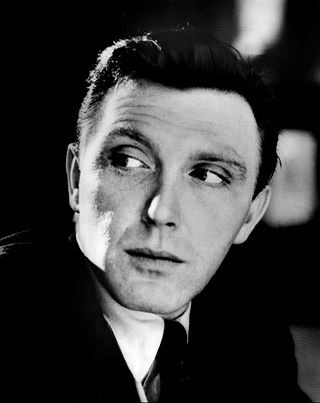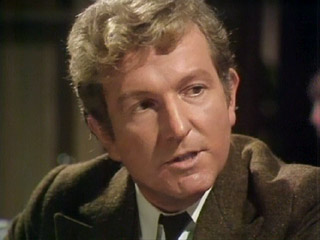Related Research Articles

Warren Mitchell was a British actor. He was a BAFTA TV Award winner and twice a Laurence Olivier Award winner.

Sir Alan Arthur Bates was an English actor who came to prominence in the 1960s, when he appeared in films ranging from the popular children's story Whistle Down the Wind to the "kitchen sink" drama A Kind of Loving.

Jiří Menzel was a Czech film director, theatre director, actor, and screenwriter. His films often combine a humanistic view of the world with sarcasm and provocative cinematography. Some of these films are adapted from works by Czech writers such as Bohumil Hrabal and Vladislav Vančura.

Robert Lansing was an American stage, film, and television actor.

Anton Diffring was a German actor. He had an extensive film and television career in the United Kingdom from the 1940s to the 1980s, latterly appearing in international films. Primarily a character actor, he often played Nazi officers in World War II films, and other antagonistic authority figures.

Mary Jackson was an American character actress whose nearly fifty-year career began in 1950 and was spent almost entirely in television. She is best known for the role of the lovelorn Emily Baldwin in The Waltons and was the original choice to play Alice Horton in the daytime soap opera Days of Our Lives, playing the part in the unaired pilot. The role was instead given to Frances Reid.

Keith Barron was an English actor and television presenter who appeared in films and on television from 1961 until 2017. His television roles included the police drama The Odd Man, the sitcom Duty Free, and Gregory Wilmot in Upstairs, Downstairs.
William Hanley was an American playwright, novelist, and scriptwriter, born in Lorain, Ohio. Hanley wrote plays for the theatre, radio and television and published three novels in the 1970s. He was related to the British writers James and Gerald Hanley, and the actress Ellen Hanley was his sister.

Norman Alden was an American character actor who performed in television programs and motion pictures. He first appeared on television on The 20th Century Fox Hour in 1957. He provided the voice of Kay in The Sword in the Stone (1963), and had a notable role in I Never Promised You a Rose Garden. His acting career began in 1957 and lasted nearly 50 years. He is also known for playing Kranix and Arblus in The Transformers: The Movie (1986). He retired from acting in 2006. He died on July 27, 2012, at the age of 87.

Keith Joseph Michell was an Australian actor who worked primarily in the United Kingdom, and was best known for his television and film portrayals of King Henry VIII. He appeared extensively in Shakespeare and other classics and musicals in Britain, and was also in several Broadway productions. He was an artistic director of the Chichester Festival Theatre in the 1970s and later had a recurring role on Murder, She Wrote as the charming thief Dennis Stanton. He was also known for illustrating a collection of Jeremy Lloyd's poems Captain Beaky, and singing the title song from the associated album.

Giuliano Gemma was an Italian actor. He is best known internationally for his work in Spaghetti Westerns, particularly for his performances as the title character in Duccio Tessari's A Pistol for Ringo (1965), Captain Montgomery Brown/'Ringo' in Tessari's The Return of Ringo (1965), the title character in Michele Lupo's Arizona Colt (1966), Scott Mary in Tonino Valerii's Day of Anger (1967) and Michael "California" Random in Lupo's California (1977).
Scott Hylands, born Scott Hylands Douglas, is a Canadian actor who has appeared in movies, on television, and on the stage. Due to his longevity and versatility, critics have called him "one of Canada's greatest actors."
Franco Rossi was an Italian film screenwriter and director, mainly known for having directed the six-hour Italian-German-British-Swiss TV mini-series Quo Vadis? in 1985.
Donald Chaffey was a British film director, writer, producer, and art director.

Philippe Leroy-Beaulieu is a French actor. He has appeared in over 150 films since 1960, and has worked extensively in Italian cinema, as well as in his native country. He was nominated for the BAFTA Award for Best Foreign Actor for his debut performance in Jacques Becker’s The Hole (1960), and for a Primetime Emmy Award for Outstanding Lead Actor in a Limited Series or Movie for playing the title role in the Italian miniseries The Life of Leonardo da Vinci (1971). He was previously a decorated paratrooper in the French Foreign Legion, where he served in the First Indochina War and the Algerian War.
Peter Alan Yeldham was an Australian screenwriter for motion pictures and television, playwright and novelist whose career spanned five decades.
Marc Wilkinson was an Australian-British composer and conductor best known for his film scores, including The Blood on Satan's Claw, and incidental music for the theatre, most notably for Peter Shaffer's The Royal Hunt of the Sun. His compositional approach has combined traditional techniques with elements of the avant-garde. After residing for most of his life in the United Kingdom, he retired from composition and lived in France.
Alan Gibson was a Canadian director active in British film and television. He was particularly notable in his early years for his work in horror. The films he directed include Journey to Midnight (1968), Crescendo (1970), Dracula A.D. 1972, The Satanic Rites of Dracula (1973), Checkered Flag or Crash (1977), Witness for the Prosecution (1982) and A Woman Called Golda (1982) starring Ingrid Bergman. His television work includes Eh Joe (1965), The Capone Investment (1974), Churchill and the Generals (1979) and The Charmer (1987).
Oscar Ralph Whitbread was an English-Australian producer who worked extensively in television.
Norman Rosemont was an American producer of films, television, and theatre.